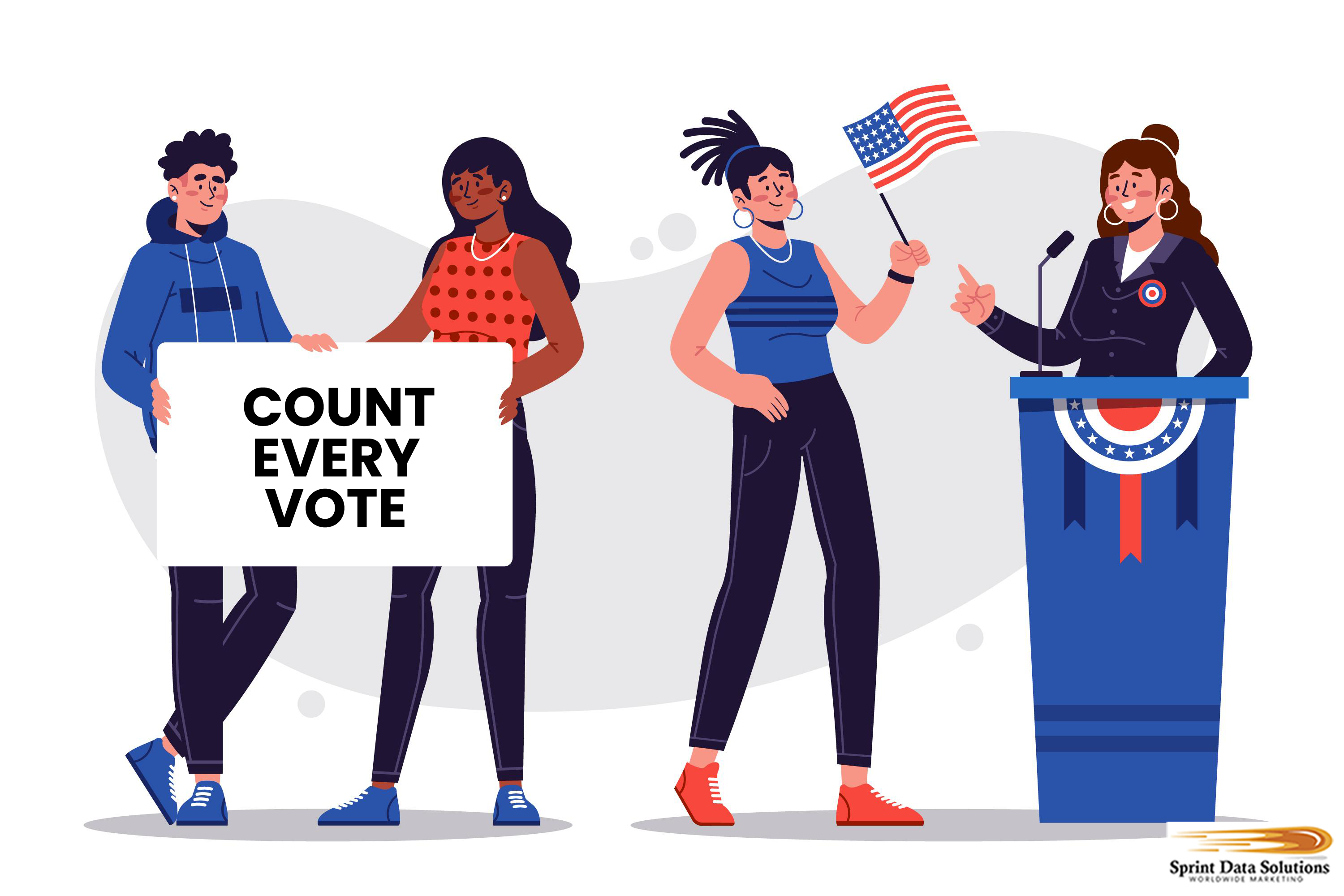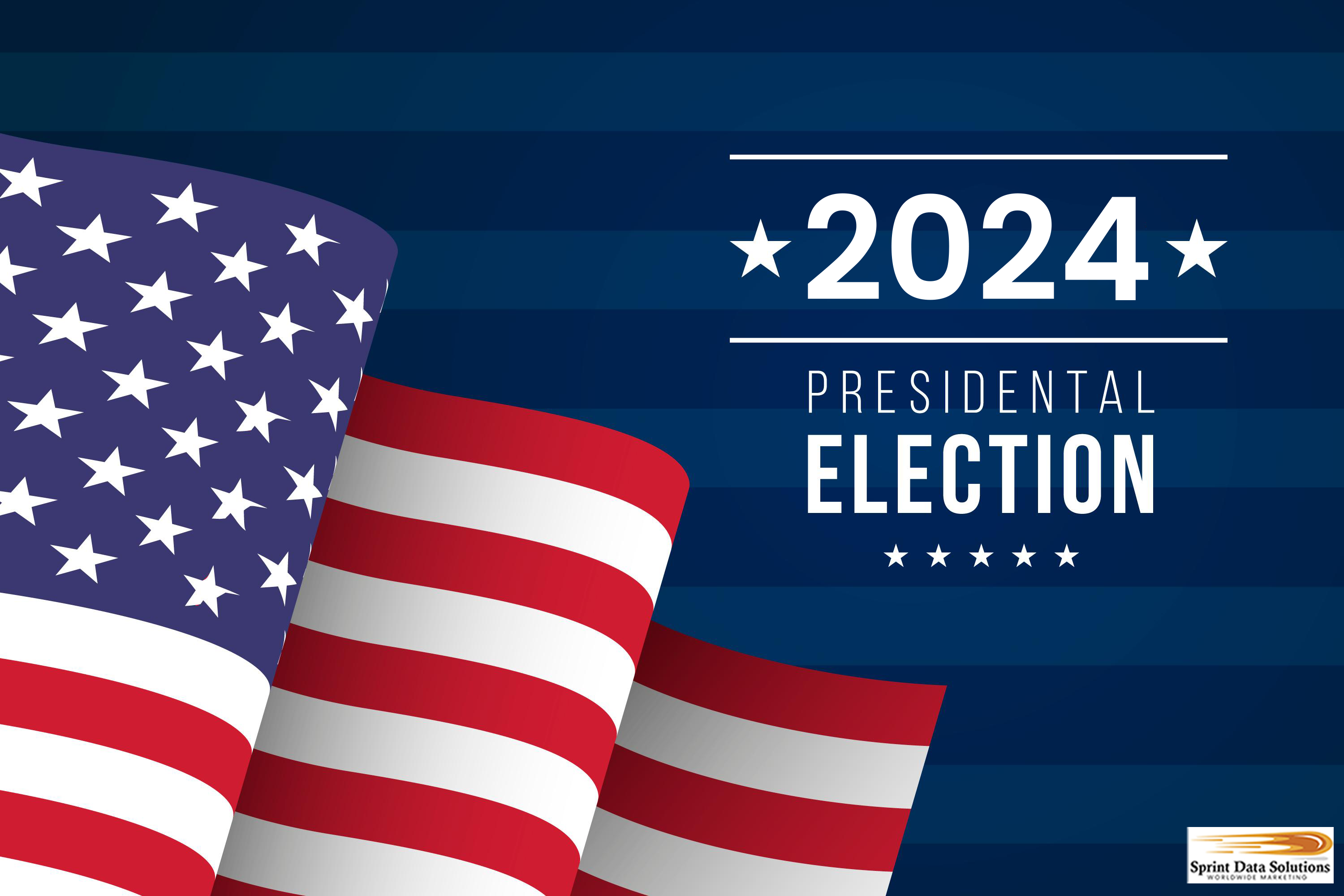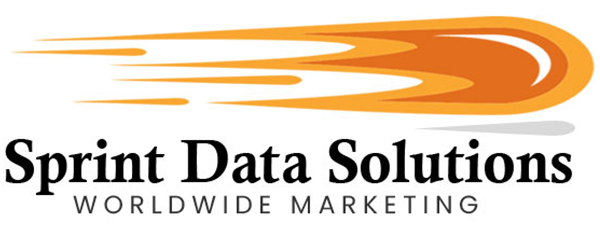Registered Voter Mailing List
From its founding, the United States has stood out as one of the few nations to be built entirely on the foundation of democratic governance. The guiding principle that the power of government stems from the will of the people has shaped American society for over two centuries. Unlike many countries that transitioned into democracy from monarchies or authoritarian regimes, the United States began with the radical notion that citizens themselves would be the ultimate authority in choosing their leaders. This principle is exercised at multiple levels of governance—local municipalities, county jurisdictions, state assemblies, and the federal government. Whether selecting a city council member or the President of the United States, American citizens have continuously had a voice in shaping the course of their governance.
Central to this democratic framework is the process of elections—organized events where eligible voters select from a slate of candidates who campaign vigorously to earn public support. Campaigns serve a vital role in informing the electorate, highlighting policy differences, and offering platforms for debate and vision. These campaigns employ numerous strategies—from grassroots community engagement to digital advertising—to reach a diverse and widespread audience. As election day arrives, voters can participate through in-person voting at designated polling stations or by utilizing mail-in ballots, which have increasingly become a vital component of the voting process. This flexibility ensures that democratic participation is accessible to individuals regardless of physical ability, work schedule, or geographic location, thereby strengthening the inclusivity of the electoral process.
Today, voting in America reflects a more modern, adaptable system. The introduction and expansion of absentee and mail-in voting options have transformed the way citizens engage with their democratic rights. These innovations have not only improved voter turnout but also ensured that those facing mobility challenges, illness, or inflexible work conditions are not disenfranchised. This evolution of voting logistics is an ongoing testament to the country’s commitment to refining and safeguarding its democracy in a changing world.
Even during years when the national spotlight is not on a presidential election, the democratic process continues unabated. Local and state-level elections remain a constant fixture in the civic landscape, affecting essential issues such as education, infrastructure, and public safety. At the same time, behind the scenes, preparations begin early for the next national election cycle. Political parties—both major and minor—begin strategizing, fundraising, and organizing outreach campaigns aimed at mobilizing support and increasing voter awareness. It’s a dynamic, year-round endeavor that ensures the electorate is engaged and informed, even between major elections.
Sprint Data Solutions Worldwide Marketing has long been a trusted partner in this democratic endeavor. With extensive experience in supporting political campaigns and civic organizations, the company plays a crucial role in connecting candidates with voters through strategic marketing and data-driven outreach. As the nation gears up for its next presidential election and continues with essential local and regional contests, Sprint Data Solutions is poised once again to provide the critical support necessary to help campaigns run effectively, ensuring that the democratic machinery continues to function with precision, inclusivity, and integrity.
About Sprint Data Solutions Worldwide Marketing
Sprint Data Solutions Worldwide Marketing is the realized vision of a disabled veteran who transitioned from a life of military service into the world of business entrepreneurship. With deep pride in his service and a strong commitment to national growth, the founder—who remains the owner and active operator—channeled his passion and discipline into creating a 100% American-owned and -operated enterprise. The journey began with a clear mission: to contribute to the country’s economic development by empowering businesses to thrive through expanded customer outreach. Anchoring the business in Las Vegas, Nevada, the founder began with humble roots and a local focus. However, through a consistent track record of delivering tangible results and value to clients, Sprint Data Solutions rapidly gained a reputation for effectiveness and integrity. Today, the company proudly employs a dedicated team with over half a century of combined experience in marketing and promotional strategies.
Sprint Data Solutions initially entered the marketplace through direct mail marketing—an established and effective method long before digital platforms transformed the marketing landscape. This early focus on direct mail laid a strong foundation in customer targeting and data management. The company built extensive proprietary databases rich with valuable consumer insights, including names, mailing addresses, purchasing behavior, and demographic specifics. These datasets became powerful tools for businesses looking to launch precise, results-driven marketing campaigns. The efficacy of Sprint Data’s approach fueled consistent growth, eventually enabling the company to expand far beyond the Las Vegas market. Operations soon stretched across the continental United States and were later extended to include Alaska and Hawaii, achieving full national coverage.
Buoyed by its success, Sprint Data Solutions continued its upward trajectory by scaling its services across North America. Businesses in Canada and Mexico gained access to the same high-caliber data-driven marketing expertise, creating a tri-national service footprint. As client needs evolved and globalization became essential, the company once again rose to the occasion—this time extending its reach overseas. Today, Sprint Data Solutions empowers companies with access to international markets, including key European Union countries such as France. The company stands as a testament to what disciplined vision, data intelligence, and client-centric service can achieve, continuing to innovate in a rapidly changing marketing environment.

Elections Are Different In The New Millennium
The democratic process has undergone profound transformations over the years, particularly in how political candidates engage with voters. While the core objectives of campaigning remain rooted in persuading the electorate—demonstrating a candidate’s legitimacy, qualifications, and vision for governance—the methods used to accomplish these goals have evolved significantly in response to technological advancements. Whether the election is at the municipal, state, or federal level, candidates must communicate their platforms effectively, assure voters of their integrity, and make compelling promises about the policy changes they intend to implement upon taking office.
Historically, in the absence of mass communication, political campaigns relied heavily on face-to-face engagement. Candidates traveled extensively to meet constituents, deliver public speeches, and foster personal connections. Supplementing this outreach were printed materials such as pamphlets, posters, and newspaper editorials that provided additional information to those interested. The introduction of radio broadcasting in the early 20th century marked a major turning point, enabling candidates to amplify their voices far beyond physical appearances. Through radio, political messages could reach rural and urban listeners alike, significantly expanding a campaign’s influence.
The rise of television brought yet another revolution. With the addition of visuals, political campaigns began to craft more image-conscious strategies. Candidates’ appearances, body language, and stage presence became critical components of public perception. The television era introduced tools such as televised advertisements, nationally broadcast debates, and interview segments that redefined how political messaging was delivered and consumed. Visual storytelling, branding, and emotionally charged advertising became essential in shaping public opinion.
In recent decades, the emergence of the Internet has introduced the most dramatic shift yet in the political landscape. Unlike earlier media, the Internet facilitates two-way communication, fosters global connectivity, and allows for unprecedented precision in message targeting. Campaigns now have access to vast data troves compiled from user behavior, online activity, social media interactions, and digital memberships. These data points are often aggregated and analyzed to create detailed voter profiles, enabling hyper-personalized outreach that speaks directly to individual concerns and interests.
Moreover, digital platforms have fundamentally altered how political content is distributed and consumed. Gone are the days of needing to tune into a specific channel at a scheduled time. Today, campaign messages—videos, articles, livestreams, tweets, and more—can be accessed on-demand from virtually anywhere using smartphones, tablets, or computers. Social media, email campaigns, and online forums have replaced or augmented traditional methods, allowing candidates to maintain a constant presence in voters’ lives. The Internet has not only democratized access to political discourse but also raised questions about data privacy, misinformation, and the influence of algorithm-driven content, all of which continue to reshape the democratic process.
Who Benefits
Sprint Worldwide Solutions Marketing offers a comprehensive and meticulously curated range of contact lists that span a diverse set of categories. These lists include not only individual consumers but also encompass businesses, nonprofit organizations, and institutional entities. Each dataset is enriched with up-to-date contact details, behavioral insights, and demographic profiles, enabling targeted outreach and strategic engagement. A particularly impactful segment of these offerings pertains to the political landscape. Here, the lists extend beyond mere contact information to provide a deeper understanding of voter tendencies, political affiliations, donation patterns, and activism levels. Whether for campaign mobilization, advocacy initiatives, or policy promotion, these political lists empower clients to connect with individuals and groups positioned to drive meaningful political action. Some of the key list categories available include registered voters, political donors, advocacy group members, issue-based supporters, and grassroots influencers, offering unparalleled granularity for precise audience targeting.
Registered Voter Mailing Lists
One of the cornerstones of American democracy is the active participation of citizens who have taken the crucial step of registering to vote. Voter registration is not only a legal prerequisite in most states but also a meaningful declaration of civic engagement. Depending on the jurisdiction, individuals may be required to register well in advance of an election or may be allowed to register on the same day at the polls. Some states also require voters to indicate a political party affiliation—such as Republican, Democrat, or Independent—especially in order to participate in primary elections, while others offer more flexibility or allow unaffiliated registration. Regardless of these differences, the common thread is that registered voters have made a conscious decision to be counted in the democratic process. This act of registration demonstrates a heightened level of political awareness and engagement, making these individuals especially responsive to political messaging and outreach. They represent a valuable audience for campaigns, advocacy efforts, and issue-based communications because they have already signaled their willingness to participate in shaping the country’s future.
State Voters Mailing Lists
While the presidential election garners the most media attention and public visibility, it is often the state-level elections that have the most immediate and tangible impact on people’s daily lives. These elections determine key leadership roles such as governors, state legislators, attorneys general, and secretaries of state—officials who make decisions on issues ranging from education funding and healthcare access to criminal justice policies and infrastructure development. State-level votes also influence national governance through the election of U.S. Senators and Representatives, who represent the state’s interests in Congress.
Because these elected officials hold the power to enact laws and allocate resources within their jurisdictions, their decisions can shape the economic and social realities of the communities they serve. From setting tax rates and managing disaster responses to regulating housing and environmental standards, state governments have broad authority. This makes the participation of state voters essential for shaping policies that directly affect schools, local businesses, transportation systems, and public safety.
Given the significance of these roles, it is critical for campaigns to engage state voters in meaningful ways—educating them on candidates’ platforms, policy implications, and the long-term consequences of electoral outcomes. Mobilizing voters at the state level is not just about winning an election—it’s about empowering citizens to shape the future of their communities through informed decision-making.
National Voter Mailing Lists
For larger-scale political campaigns—especially those concerning federal-level issues or high-stakes elections like a presidential race—it becomes essential to maximize outreach. In such instances, the use of national voter mailing lists is a key strategy. These lists provide access to millions of registered voters across the country, allowing campaigns to disseminate targeted messages on a massive scale. This approach is particularly effective for promoting nationwide initiatives, influencing public opinion on federal policies, or rallying support for candidates whose platforms impact all Americans. By leveraging national data, campaigns can tailor messages by demographics, voting history, or geographic location, ensuring broader reach and improved engagement compared to more localized efforts.

Voter Precinct Mailing Lists
Voting precinct mailing lists play a pivotal role in grassroots political efforts, particularly when campaigns or initiatives aim to engage voters directly within their local communities. These lists provide detailed insights into registered voters within the smallest geographic units of an electoral district—precincts—allowing political organizers to tailor their outreach with precision. Whether it’s a local council election, a state legislative race, or a national campaign, having access to up-to-date precinct-specific voter information ensures that political messaging reaches the right people in the right locations. This enables campaigns to target communications, schedule canvassing efforts, and mobilize supporters more effectively. In any strategic political operation, understanding who the voters are and how to contact them at the neighborhood level can make the difference between winning and losing an election.
Political Donor Mailing List
While casting a vote is a foundational civic duty in democratic societies, many Americans choose to go beyond the ballot box by financially supporting political movements and campaigns. Running a political campaign, especially at the state or national level, demands considerable funding—for staff, advertising, outreach, travel, and more. As such, donations from citizens often serve as the financial lifeblood of political activity in the United States.
These contributors represent a broad cross-section of society, spanning all socioeconomic backgrounds. For many working-class individuals, a candidate who resonates deeply with their values or offers a vision of hope can inspire modest yet meaningful contributions. Among the middle class, political donations are frequently an extension of ideological engagement, with donors viewing their financial support as a way to promote ideas or policies they believe in. At the top of the spectrum are the wealthiest donors, whose financial influence can be substantial. These high-level contributors may be motivated by a mix of personal convictions and strategic interests, such as advancing specific legislation or bolstering candidates aligned with their business or policy preferences.
Regardless of the donor’s income level, their contributions collectively shape the political landscape, funding everything from grassroots campaigns to major presidential bids. In doing so, they not only support their preferred candidates or causes but also actively participate in the broader democratic process.
Conservative Political Donors
In a political landscape dominated by two major parties, it is expected that donor affiliations often align with partisan ideologies. Conservative donors, in particular, typically support the Republican Party, backing candidates and causes that reflect traditional values and right-leaning policies. These donors are often united around key issues such as opposition to expansive gun control legislation, promotion of Christian values in public life, and support for more stringent immigration enforcement. Additionally, they may prioritize limited government, lower taxes, and a strong national defense. For individuals or organizations engaged in political campaigns or advocacy efforts that resonate with conservative principles, establishing connections with conservative donors can be a critical step toward achieving funding and influence. This becomes especially significant during pivotal political moments, such as local and national election cycles, when conservative donors are more likely to contribute generously to candidates or initiatives that advance their ideological goals.
Liberal Political Donors
Liberal political causes have long played a significant role in shaping American discourse, often aligning with the Democratic Party’s platform. These causes advocate for a broad range of issues including reproductive rights, climate change mitigation, universal healthcare, LGBTQ+ equality, racial justice, and expanded access to quality education and social services. In contrast to their conservative counterparts, liberal movements frequently emphasize social equity and systemic reform. This commitment has led to the establishment of powerful advocacy networks, grassroots organizations, and political action committees that mobilize volunteers, voters, and financial contributors.
In recent years, the urgency and visibility of liberal causes have intensified, particularly following major legal and legislative changes. The overturning of Roe v. Wade, for example, galvanized a resurgence of activism centered on reproductive freedom and women’s health rights. Simultaneously, challenges to LGBTQ+ protections, voter rights, and environmental regulations have further energized liberal donors and campaigners. As a result, political groups that embrace progressive values have seen increased fundraising success and volunteer engagement. These developments signal a growing momentum within the liberal sphere, as supporters work to protect hard-won rights and push for transformative policies at both state and national levels.
Independent Voter Mailing List
While most Americans tend to register as voters aligned with one of the two dominant political parties—Democratic or Republican—there is a growing and influential segment of the population that prefers to remain unaffiliated. These voters, often identifying as independents, prioritize policy over party loyalty. Rather than committing to a single party’s platform, they evaluate candidates based on specific stances and how well those align with their personal beliefs or pressing issues, such as healthcare, the economy, education, or climate change. Although independent voters may be restricted from participating in party-specific primaries in certain states, they wield considerable influence in general elections, where their votes can decisively sway outcomes. Additionally, their financial contributions and advocacy often support candidates across the political spectrum, amplifying the impact of issue-based campaigning. For candidates and parties seeking to attract these voters, success lies in clearly communicating compatible values and demonstrating a genuine commitment to addressing the topics that matter most to this discerning demographic.
Undecided Voters Mailing List
Undecided voters represent a critical yet frequently underestimated segment of the electorate. These individuals are not disengaged from the democratic process; rather, they are active participants who have not yet aligned themselves with a specific candidate or political platform. Unlike non-voters, undecided voters intend to cast a ballot but require additional information, reassurance, or persuasive messaging before making a final decision. Their indecision may stem from conflicting priorities, dissatisfaction with available options, or a desire for more substantive policy details. In tightly contested races—particularly those without a clear frontrunner—undecided voters can wield significant influence. Even a small shift in this group’s support can tip the balance, making them a vital target for campaign outreach, debates, and grassroots engagement. As recent elections have demonstrated, the power to sway the outcome often lies not with the committed base but with those still open to being convinced.
Political Activists Mailing Lists
Political activism extends far beyond the realm of fulfilling basic civic duties or making financial contributions to support political campaigns. While financial support is undoubtedly helpful, it is often the commitment of time, energy, and personal involvement that propels a movement forward and drives societal change. Political activists are essential actors in the democratic process—they are individuals who passionately champion causes and are motivated by deeply held beliefs, often dedicating significant portions of their lives to advocating for justice, equity, or policy reform.
Their contributions manifest in a wide array of actions. On the grassroots level, activists often volunteer for campaign operations such as phone banking, canvassing door-to-door, organizing rallies, or helping manage logistical and administrative tasks. These efforts are crucial during election seasons when mobilizing voters and spreading information becomes urgent. Beyond the campaign trail, activists play a pivotal role in sustaining momentum for social or political issues. This includes organizing and participating in public demonstrations, protests, and sit-ins—forms of direct action designed to raise awareness, pressure decision-makers, and inspire collective action.
Moreover, political activists help foster community engagement by educating citizens, encouraging voter registration, and creating platforms for underrepresented voices. Their work often challenges the status quo and brings attention to overlooked or marginalized issues. In doing so, activists not only contribute to immediate political outcomes but also help shape long-term public discourse and policy direction. In sum, political activism is a multifaceted and powerful force that relies not just on funding, but on the unwavering dedication of individuals willing to stand up, speak out, and take action for the causes they believe in.
Swing State Voters
At the federal level, one of the most influential voter demographics—particularly in the context of Presidential elections—is the population of swing state voters. Unlike states with strong partisan leanings, such as California, which consistently supports Democratic candidates, or Texas, which traditionally aligns with Republican choices, swing states represent unpredictable battlegrounds that can shift election outcomes. States like Pennsylvania, Michigan, Wisconsin, Arizona, and Georgia have, in recent elections, demonstrated the potential to flip between parties based on nuanced changes in voter sentiment and turnout. As a result, these states command a disproportionate share of attention from national campaigns, often receiving the most strategic investments in terms of advertising, grassroots mobilization, and candidate appearances. Accurate, real-time databases focusing on voter behavior, regional concerns, and historical voting patterns in swing states are essential assets. Campaigns that proactively analyze and act on these insights are far more likely to influence the outcome where federal-level decisions hinge, making targeted engagement in these regions a cornerstone of electoral success.

A New Election Is Coming
In the United States, although the next presidential election is not scheduled until November 2024, the foundational work for any serious campaign begins long before ballots are cast. Seasoned political strategists understand that success at the polls hinges on early and meticulous preparation. The groundwork laid in the months and even years leading up to Election Day can determine whether a campaign gains critical momentum or falls behind. Effective voter outreach, accurate data targeting, and consistent engagement are essential elements of a winning strategy. Sprint Data Solutions Worldwide offers a strategic advantage by delivering comprehensive multichannel voter contact services tailored to every voting district across the nation. Whether through direct mail, digital marketing, telemarketing, or email campaigns, we ensure that political messages reach the right voters at the right time. With the power of advanced analytics and segmented data, candidates and political organizations can act with precision, build trust with constituents, and drive meaningful voter response well ahead of Election Day.
Reach The Groups You Need
Sprint Data Worldwide Solutions provides comprehensive access to highly detailed voter and political contact databases, which go beyond simple contact information to include robust demographic, psychographic, and behavioral insights. This data is meticulously compiled through a combination of verified surveys, transactional records, public voting data, and permission-based mailing list acquisitions. These resources empower political campaigns and advocacy groups to precisely target constituents, tailoring their outreach strategies based on key indicators such as income levels, age groups, education, party affiliation, past donation behaviors, and voter turnout trends.
Utilizing advanced big data analytics and machine learning algorithms, this information can be segmented, categorized, and cross-referenced across numerous criteria to uncover hidden patterns and voter sentiments. Whether it’s a grassroots initiative or a nationwide campaign, candidates can leverage this intelligence to identify persuadable voters, mobilize core supporters, and fine-tune messaging for maximum impact. The result is a data-driven electoral strategy that increases engagement, improves response rates, and optimizes resource allocation by focusing outreach on the most influential and receptive demographic segments.
- Ethnicity
- Age
- Children’s Age
- Debt
- Homeowner
- Renter
- Marital Status
- Income
- Veteran Status
- Geography
- Mortgage Data
And more.
Voter contact information goes beyond just physical mailing addresses. Today’s outreach strategies can include a variety of channels—direct mail, email campaigns, SMS/text messaging, and phone calls—all designed to ensure that your message reaches the right audience, at the right time, in the most effective way. Whether you’re aiming to engage voters, mobilize volunteers, or secure financial support from donors, having access to high-quality, segmented voter data is crucial. At Sprint Data Solutions Worldwide, we specialize in delivering customized voter mailing lists tailored to your specific goals and demographics. From age and political affiliation to geographic location and donor history, our databases help improve targeting accuracy and boost the success rate of your campaign efforts—ultimately increasing your chances of securing a win on election day.






